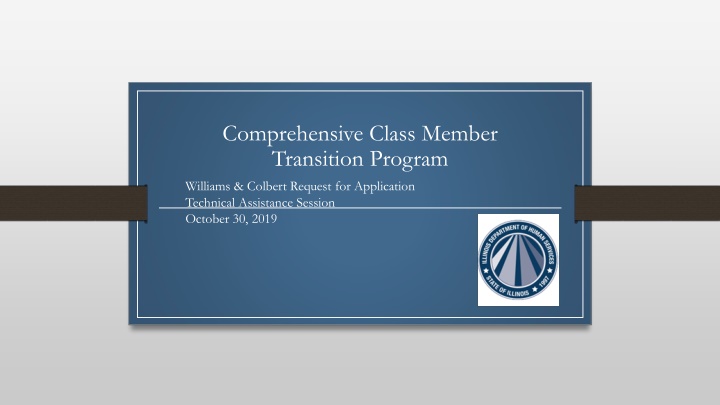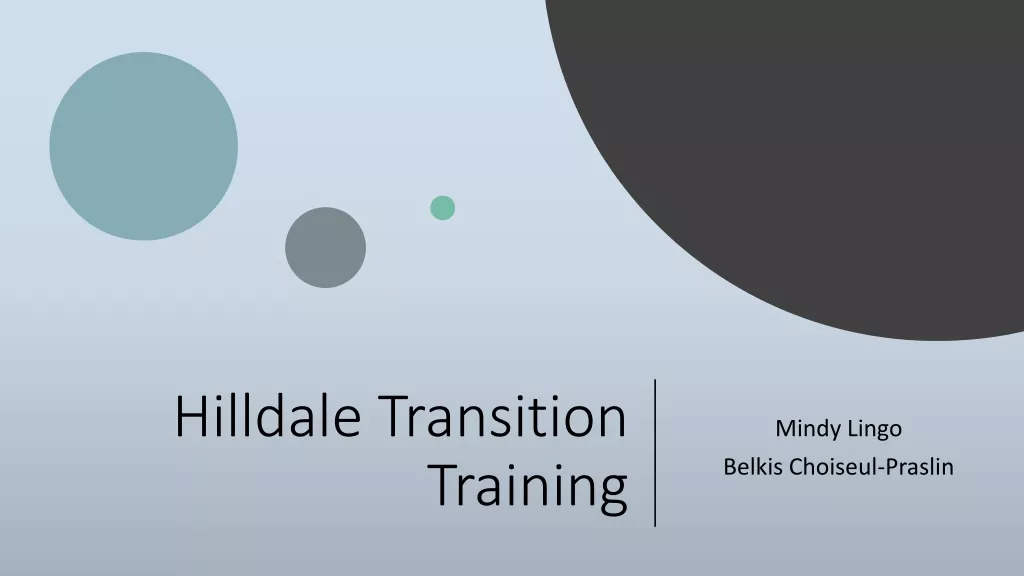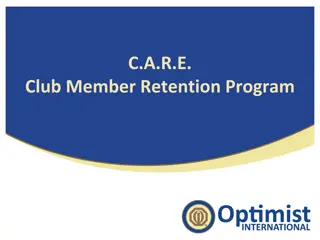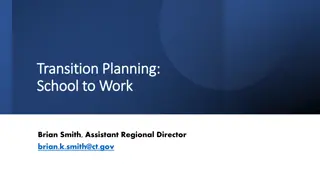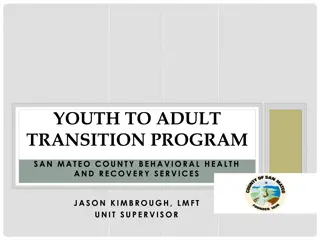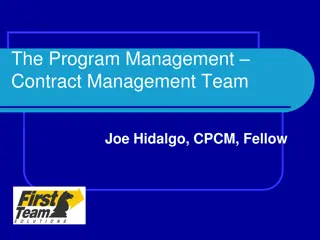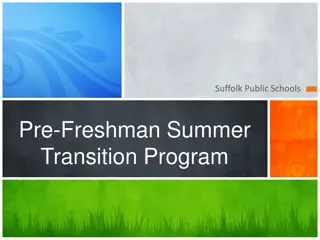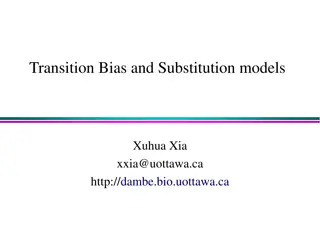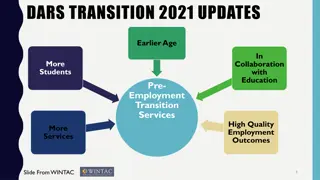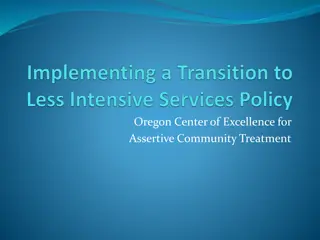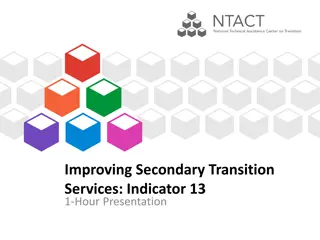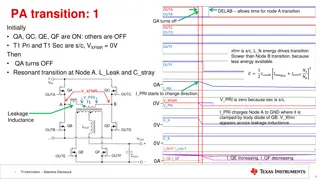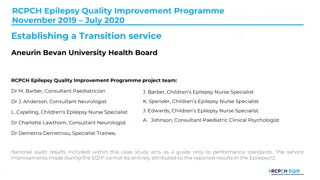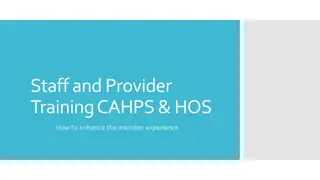Comprehensive Class Member Transition Program
The Comprehensive Class Member Transition Program aims to achieve compliance with legal decrees by providing integrated services for individuals with Serious Mental Illness. Learn about the Williams and Colbert consent decrees and the transition process for eligible members to community-based settings in Illinois.
Download Presentation

Please find below an Image/Link to download the presentation.
The content on the website is provided AS IS for your information and personal use only. It may not be sold, licensed, or shared on other websites without obtaining consent from the author.If you encounter any issues during the download, it is possible that the publisher has removed the file from their server.
You are allowed to download the files provided on this website for personal or commercial use, subject to the condition that they are used lawfully. All files are the property of their respective owners.
The content on the website is provided AS IS for your information and personal use only. It may not be sold, licensed, or shared on other websites without obtaining consent from the author.
E N D
Presentation Transcript
Comprehensive Class Member Transition Program Williams & Colbert Request for Application Technical Assistance Session October 30, 2019
Welcome and Introduction Grace B. Hou, Secretary Illinois Department of Human Services
Williams and Colbert Consent Decrees Overview
Williams Consent Decree On September 29, 2010, the State of Illinois entered into a Consent Decree, settling the Williams v. Pritzker class action lawsuit, first filed in 2005. The lawsuit alleged that Illinois was in violation of Title II of the American with Disabilities Act (ADA) and Section 504 of the Rehabilitation Act by "needlessly segregating" Plaintiffs, a class of approximately 4,500 Illinois residents with Serious Mental Illness (SMI) living in Nursing Facility/IMDs (Institutes of Mental Disease), now named SMHRF (Specialized Mental Health Rehabilitation Facilities) and denying them opportunities to receive services in more integrated settings. Though the State denied liability and any violation of these federal laws, the Parties to the suit were always fundamentally in agreement that, when clinically appropriate, consistent with the parameters now set forth in the Williams Consent Decree, all persons with Serious Mental Illness currently residing in SMHRF in Illinois have the right to choose to live in community-based settings, and that the State has an obligation to expand the current community-based service system to support the needs of those individuals. This is in keeping with an aim of providing services to an individual in the least restrictive and most integrated setting possible.
Colbert Consent Decree On December 20, 2011, the State of Illinois entered into a Consent Decree, settling the Colbert v. Pritzker class action lawsuit, first filed in 2007. The lawsuit sought declaratory and injunctive relief to remedy alleged violations of Title II of the Americans with Disabilities Act (ADA), and Section 504 of the Rehabilitation Act and the Social Security Act. Plaintiffs alleged that members of the class were unnecessarily segregated and institutionalized in nursing facilities, and that they were denied opportunity to live in appropriate community integrated settings where they could lead more independent and productive lives. The Colbert Consent Decree requires the State to provide Class Members the necessary supports and services to allow Class members to live in the most integrated settings appropriate to their needs in community-based settings. Eligible Class Members must currently live in a nursing home located in Cook County, Illinois, and must be receiving or be eligible to receive Medicaid.
Comprehensive Class Member Transition Program Request for Application (RFA) Application and Submission Information
Goal to Achieve Compliance The overarching goal of the Comprehensive Class Member Transition Program is to achieve compliance with the requirements of both the Williams and Colbert Consent Decrees. IDHS believes that ensuring the availability of integrated, high-quality services for Class Members and minimizing the number of handoffs between providers holds the greatest promise to reverse years of noncompliance. The Program will allow the State fulfill a number of objectives in the interest of the Consent Decrees.
1. Maximize continuity of services by prioritizing contracts with providers who can work with class members along the entire continuum of services. The continuum includes the three core services required by both consent decrees (Outreach, Resident Review/Evaluation, and Transition Coordination) as well as an array of ancillary services that address various barriers to transition. Reducing the number of handoffs between providers, reducing the administrative burden, and creating efficiencies. 2. This program approach allows DHS the flexibility to contract with providers who can provide this broad, soup-to-nuts service array. If necessary, the State may continue to contract with providers for a narrower service array to preserve access to required services in certain parts of the state where soup-to-nuts contracts may not be feasible. Compliance Objectives 3. Increase and maintain the capacity of providers to serve class members by offering an expenditure-based funding model with advance-and-reconcile payments for FY20 and for future fiscal years if providers have adequate financial management systems under GATA. Smaller outcome-based payments may be offered as a supplemental incentive for high performance.
4. Better integrate and align services and reporting requirements for Colbert and Williams class members, ensuring that all class members can access appropriate services regardless of institutional placement. 5. Investigate the actual cost and effort associated with serving class members by studying provider expenditures along with performance metrics and outcomes. Historically, the methodology for setting rates and award amounts for consent decree services varied by service, and none of the rates or award amounts in effect today were established using actual cost data. As a result, the State does not have insight into the level of funding required to sustain an Olmstead-compliant service system. The program will allow DHS to ascertain the cost of maintaining system capacity to serve class members. Compliance Objectives 6. Identify opportunities to better align the Olmstead service system with the Medicaid program, both in terms of covered services and the managed care service delivery system. 7. After a 17-month program period, plan a competitive grant NOFO, pursuant to GATA, for FY 2022, informed by key learnings from this program.
Scope of Services Grantees will be responsible for providing oversight and care management of the entire process entailed with transitioning Class Members to Community-Based Settings, including ensuring adequate supports are in place post-transition for the Class Member to safely and successfully remain in the community. Grantees will be responsible for orchestrating the necessary resources, building organizational capacity, entering into partnerships with subgrantees, if needed, and developing efficient processes to mitigate unnecessary delays and effectuate safe transitions for Class Member. Under the Program, Grantees are required to provide a broad array of services/activities and supports that are essential to timely and efficiently facilitating a Class Member's move from the Nursing Facilities (NFs) or Specialized Mental Health Rehabilitation Facilities (SMHRFs)/Institutions for Mental Disease (IMDs) to the community. Transition Services and the ancillary services outlined under this grant, are the means to ensure that all efforts necessary to facilitate transitions to the community occur and that they occur under a vision of unified and/or coordinated attention.
Primary Services Outreach to Class Members still residing in Nursing Facilities (NFs) or Specialized Mental Health Rehabilitation Facilities (SMHRFs) to inform them of their rights to seek transition services under both the Williams and Colbert Decrees; Resident Reviews/Evaluations of Class Members to determine appropriateness for transition to a Community-Based Setting based on Consent Decrees' mandates; Transition coordination
Ancillary Services SSI/SSDI Outreach Access and Recovery (SOAR); Integrated Healthcare (including nursing care and occupational therapy); Transition Fund availability and administration; Flexible funding; and Medicaid Spenddown buy-in capability for Class Members with a Spenddown.
Capacity and QA Services Quality Assurance staff to serve as a liaison to IDHS to monitor and report quality of care and outcomes. Secure adequate service capacity to support safe and successful Class Member transitions and tenure in the community, by any means appropriate, including, but not limited to staff retention bonuses/incentives. Use of grant funds to cover costs not covered by Medicaid to create new or expand existing ACT or CST teams for Class Members requiring these levels of care, this includes start-up costs for these Medicaid-billable services.
Strategy The Department is issuing this RFA to contract with capable Applicants that directly, or working with subgrantees, can provide a comprehensive set of services to these individuals, including outreach and engagement; evaluation; support services, including peer-to-peer; and placement in appropriate housing. After placement of a Class Member in the community, the successful Applicants will be expected to provide, directly and/or working through subgrantees, the entire array of support services necessary for these individuals to thrive in their new living environment. Applicant organizations can apply to deliver all the services described herein, either independently, along with subgrantees, or (other than tracking, managing, reporting, and communicating regarding the process) entirely through subgrantees, as a network of organizations responsible for delivering these services. Regardless of the method of service delivery, the Applicant must be able to successfully demonstrate their ability to fully, safely, and actively engage, evaluate, and transition individuals from their current living arrangements into community living arrangements approved under the Williams and Colbert Consent Decrees.
Illinois RFA Regions In your one application, you must clearly state which geographic coverage area(s) you plan to provide services consistent with the Grant. The full array of services must be offered to anyone who transitions from an SMHRF or NF from your awarded area either directly or by subgrantee/subcontractor no matter where they choose to reside in the State of Illinois. Most Class Members choose to stay within their originating county, however many from Cook County do choose to reside in the collar counties. The geographic coverage areas are: Cook County (North) Cook County (Central) Cook County (South) Northern Collar Counties (McHenry, Lake, Kane, DuPage) Southern Collar Counties (Kendall, Will, Grundy, Kankakee) Macon County (Decatur) Peoria County (Peoria)
Successful Applicants Will Have: Staff who are trained to work with Class Members and Facility staff (NFs or SMHRFs) and to interface with ancillary systems. Staff who are trained to work with Managed Care Organizations for the purposes of coordinating care, specifically services related to transitions from institutional settings into Community-Based Settings. Staff who are trained to work with landlords, property managers, and to interface with vendors for the purpose of moving Class members into safe, affordable housing with needed furnishings and household supplies. Licensed, sufficiently experienced individual(s) in a supervisory capacity to oversee this program. Required credentialed staff and/or the ability to hire and maintain required credentialed staff (e.g. LPHA, LCSW/LCPC, RNs, etc.).
Successful Applicants Will Have: A history of delivering non-Medicaid billable services to individuals with mental illness or other disabilities (including current Williams or Colbert Class Members) enrolled in a Medicaid managed care plan, including, but not limited to creating new or expanding existing ACT or CST teams for Class Members requiring these levels of care or administering transition assistance funds. Contracts with any Medicaid managed care plans, such as for care coordination/management or transition activities outside of the Williams and Colbert Consent Decrees. Vehicles available to transport Williams and Colbert Class Members, including Class Members in wheelchairs and requiring other physical accommodations. Facility access, resources, and office and technical equipment to carry out the program. The capacity to cover a wide enough service area to provide services in the geographic area of the Class Member's choice (within Illinois) to satisfy Class Members' facility location and desired housing location.
Funding Information The Department anticipates the availability of approximately $12,390,558 for services in FY20 (February 1, 2020 - June 30, 2020). In the event IDHS continues this funding, the FY21 (July 1, 2020 - June 30, 2021) anticipated available funding is $29,737,340. Separate awards will be issued for the Williams Consent Decree and the Colbert Consent Decree to ensure that the Department tracks expenditures and activities as required in each Consent Decree.
Payment Information For at least the initial term of the Agreement (February 1, 2020 to June 30, 2020), the Department will use an advance and reconciliation method of payment. Expenditures are to be in accordance with the detailed budget submitted by the Grantee, as part of their response to the RFA. Subsequent to the initial advance the Grantee will receive additional prospective payments based on a reconciliation of the funds advanced to the funds being requested. Expenditures incurred for the purchase of allowable goods and services necessary for conducting program activities shall be documented in a manner prescribed by the Department. Unexpended funds will be returned to the Department, per the Grant Funds Recovery process. Grantees will be assigned a transition target based on their RFA response and Department's Consent Decree requirements. In the event these targets are not met, the Department reserves the right to withhold a proportionate amount of funding, up to and including an amount equivalent to the deficiency, based on performance requirements not being met. Providers who exceed their transition targets will be eligible for a performance-based incentive payment, and during the grant extension period additional performance-based incentives may be available to provider who demonstrate extended and continuous community tenure post-transition.
Comprehensive Class Member Transition Program Request for Application (RFA) Eligibility Information
Eligible Applicants Public or private, for-profit or not-for-profit community-based agencies, hospital systems, Federally Qualified Health Centers (FQHC), Healthcare for the Homeless Centers (HHC), and Managed Care Organizations (MCOs) are all eligible to apply for funds. (If an interested potential Applicant is unclear if they are eligible to apply or whether they fall into any of the above categories, please ask as part of the Question and Answer process.) If a Managed Care Organization is a successful Applicant and also receives funds from the Illinois Department of Healthcare and Family Services to coordinate care for Class Members, those services cannot be duplicated under this RFA. The funding opportunity in this RFA is not limited to those who currently receive funding from the Illinois Department of Human Services, either generally, or to currently serve Class Members. Successful Applicants must hold all necessary licenses for the services to be delivered and populations to be served.
Pre-Award Requirements Register with the Illinois Grant Accountability and Transparency Act Grantee Portal Grantees must be qualified to do business with the State of Illinois. To be qualified for a grant award, a Grantee must: Have a current DUNS number; Have a current System for Award Management account (SAM.gov); Not be on the Federal Excluded Parties List; Be in Good Standing with the Illinois Secretary of State, as applicable; Not appear on the Department of Healthcare and Family Services Provider Sanctions list; Submit an Application to DHS.GrantApp@illinois.gov. Complete one Internal Controls Questionnaire (ICQ) as the Fiscal and Administrative Risk Assessment on an annual basis on the Governor's Office of Management and Budget (GOMB) website at https://grants.illinois.gov/portal/ Complete a Programmatic Risk Assessment (PRA) for each potential grant award (i.e. Williams or Colbert) on the DHSDMH webpage. Links are provided under the "PRA" column. Complete a Budget for the term February 1, 2020 through June 30, 2021 for each Consent Decree grant award in the CSA tracking database: CSA Budget/Tracking System database.
Comprehensive Class Member Transition Program Request for Application (RFA) Application and Submission Information
Application Content and Scoring Executive Summary (not scored) Agency Qualifications (20 points) Narrative (25 points) Introduction Methodology Work Plan (35 points; separate plans required for each date range) Budget and Budget Narrative (20 points; separate budgets required per Consent Decree)
Application Package Uniform State Grant Application Proposal Narrative (Limited to 20 pages) Attachments. This should include Linkage Agreements (if applicable) and an approved Negotiated Indirect Cost Rate Agreement (NICRA). All proposals must include the following mandatory forms/attachment: a) Uniform Grant Application for State Grant Assistance Program Plan Budget (subsequent template attachment to RFA), and b) Copy of Currently Approved Negotiated Indirect Cost Rate Agreement (NICRA).
Application Package Submission Applications are to be submitted by EMAIL only to DHS.GrantApp@illinois.gov Subject line of the email MUST state: Applicant Organization Name, RFA#, Applicant Organization Contact Person (ex. Abe Frohman), Region (e.g. Cook County (North) Proposed Budgets are to be submitted through CSA Portal
Application Due Date Applications are due on or before: December 20, 2019 at 5:00 pm Central Time
Merit Review Independent review of applications Team review
Merit Review Independent review of applications Team review
Program Questions and Answers Questions and answers will be posted on the Q&A link on the IDHS Olmstead Webpage: http://intranet.dhs.illinois.gov/oneweb/page.aspx?item=120486 It is the responsibility of each applicant to monitor the website and to comply with any instructions or requirements relating to the RFA.
Important Links Comprehensive Class Member Transition Program: http://www.dhs.state.il.us/page.aspx?item=120484 Request for Applications: Williams and Colbert Consent Decrees: http://www.dhs.state.il.us/page.aspx?item=120487 Attachments: Exhibits: http://www.dhs.state.il.us/page.aspx?item=120540 Facilities Lists & Targets vs. Achieved: http://www.dhs.state.il.us/page.aspx?item=120538 Regional Areas for Coverage: http://www.dhs.state.il.us/page.aspx?item=120542 Grant Application Colbert: http://www.dhs.state.il.us/page.aspx?item=120548 Grant Application Williams: http://www.dhs.state.il.us/page.aspx?item=120549 Grant Budget Template: http://www.dhs.state.il.us/page.aspx?item=120550 Programmatic Risk Assessment: http://www.dhs.state.il.us/page.aspx?item=120536
